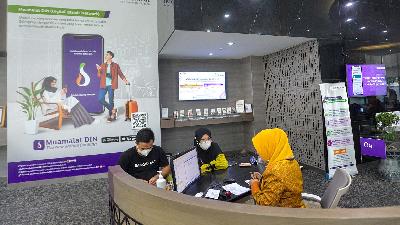The Danger of Politicizing SOE Commissioners
Monday, June 17, 2024
A number of Prabowo Subianto supporters have been appointed as SOE commissioners. This risks compromising their oversight function.
arsip tempo : 174719868747.

AT the end of his term of office, President Joko Widodo is still employing the bad practice of politicizing state-owned enterprises (SOEs). It seems like distributing seats on the Board of Commissioners of SOEs is a way of returning favors after the 2024 election that saw Prabowo Subianto elected to the presidency—along with Gibran Rakabuming Raka, Jokowi’s oldest son.
Last week, the mining holding SOE, Mining Industry Indonesia (MIND ID) appointed Gerindra politician Fuaz Bawazier as its president commissioner. Indonesian Solidarity Party (PSI) founder Grace Natalie was also awarded a commissioner’s seat. Gerindra is the party established by Prabowo, while the PSI supported Prabowo in the recent election.
At the same time, Pertamina appointed as its president commissioner another man close to the president elect Prabowo, namely Simon Aloysius Mantiri. The state oil company also appointed Condro Kirono as an independent commissioner. The two men were senior figures in the Prabowo-Gibran national campaign team.
State-Owned Enterprises Minister Erick Thohir may well claim that these appointments were not against the law. As the shareholder in SOEs, it is the government that has the right to appoint commissioners. Previous governments also appointed presidential supporters in those positions.
The problem is that the principle of the right man in the right place is no longer the determining factor, and has been replaced by the need to return favors. This is despite the fact that Law No. 19/2003 on SOE states that commissioners must have adequate knowledge of the sector in which the company operates. The main job of commissioners is to oversee and give advice on the way the company is run. Without sufficient competencies, it will not be possible for them to carry out these functions. The management of the company will increasingly differ from expectations. The spread of corruption in SOEs is directly linked with poor management and oversight.
The handing out of commissioners seats in SOEs has repeatedly disrupted the business of these companies. The latest example is when the Central Executive Board of Muhammadiyah withdrew its funds from Bank Syariah Indonesia (BSI). The total fund is estimated to be Rp13 trillion to Rp16 trillion, but Muhammadiyah has said it was Rp1.8 trillion. The withdrawal was related to the appointment of commissioners of BSI, and this led to a sharp drop in the share price of this largest sharia bank in Indonesia.
As a major client, Indonesia’s second largest Islamic mass organization was repeatedly offered a seat on the BSI Board of Commissioners. However, after it put forward names, the SOEs Ministry selected Felicitas Tallulembang, a Gerindra Party member with experience as a hospital director, as independent commissioner.
Unfortunately, this is not something new. Jokowi has frequently appointed commissioners from parties supporting the government. According to a March 2021 survey from Transparency International Indonesia, 14.3 percent of SOE commissioners are volunteers or members of parties that supported Jokowi in the 2014 and 2019 elections. The largest share, 51.6 percent, comprises bureaucrats as government representatives, and only 17.6 percent of seats are occupied by professionals.
This politicization of SOEs must stop. Seats on the boards of commissioners of SOEs must be occupied by competent people, not offered as gifts for supporters of the elected president. State-owned companies manage state assets totaling more than Rp10 trillion in order to bring prosperity to the people, not to former managers of campaign teams.











